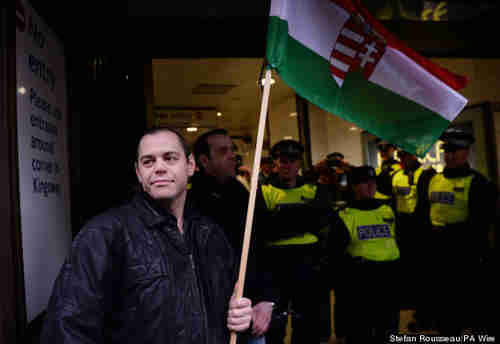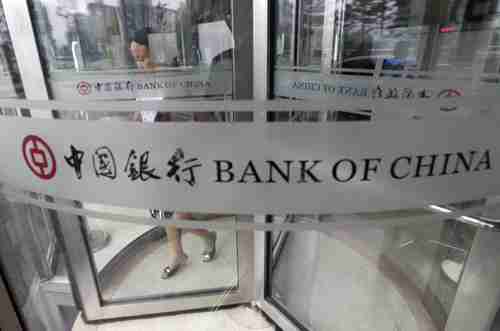This morning’s key headlines from GenerationalDynamics.com
- Hungary’s ‘fascist’ Jobbik party leader Gabor Vona speaks in London
- Hussman’s analysis of market instability
- China banks halt domestic cash transfers as fund bankruptcy looms
Hungary’s ‘fascist’ Jobbik party leader Gabor Vona speaks in London

Gabor Vona in London on Sunday, carrying a Hungarian flag, protected from anti-fascist activists by police
Gabor Vona, described as “one of Europe’s most electorally successfulfascists” spoke on Sunday to UK-based sympathizers of his HungarianJobbik Party. Demonstrations by anti-fascist campaigners preventedVona from giving his speech at the planned venue, so he ended upspeaking to around 100 supporters at Speakers’ Corner in Hyde Park.The Jobbik party, which is considered anti-Roma and anti-Semitic, isthe third biggest party in Hungary, with 43 seats in the nationalparliament. It’s thought that Vona would like to create a “commoncore” of parties across Europe that would include the British NationalParty, the French National Front, Holland’s Party for Freedom, andGreece’s Golden Dawn. Each of these parties is, to a greater orlesser extent, anti-immigrant, anti-Roma and/or anti-Semitic. Thesenationalist sentiments have been growing around Europe, for the firsttime since World War II. According to the European Union Agency forFundamental Rights, anti-Semitism has been skyrocketing in Europe,with some 66% of European Jews saying that in 2013, anti-Semitism hassignificantly impacted their lives. Independent (London) and Israel National News
Hussman’s analysis of market instability
A major correction or crash on Wall Street is long overdue ( “25-Jan-14 World View — That ‘1929 feeling’ may be back on Wall Street”), and while the timingcannot be predicted with certainty, some analysts are sayingthat there are signs that it’s not far off.
The Hussman Funds manager and analyst John P. Hussman is describing anumber of factors leading to market instability:
- “The extreme syndrome” of overvalued, overbought, overbullish, rising-yield conditions exclusively seen at the 1929, 1972, 1987, 2000 and 2007 market peaks.
- “Bullish sentiment” extremely high, with 57.7% of advisors recommending “buy,” while only 14.8% recommend “sell” — the most lopsided bullish versus bearish sentiment in decades. In other words, when everyone is telling you the same thing, then it’s time to be very nervous.
- New York Stock Exchange margin debt now at 2.5% of GDP – an amount equivalent to 26% of all commercial and industrial loans in the U.S. banking system. The 1929 crash was blamed by many economists on high margin debt.
- Currency collapses in Argentina and Venezuela.
- Fresh credit strains and industrial shortfall in China.
Each one of these factors, by itself, is not of concern. But thecombination of such factors, taken together, creates a state of marketinstability, such that any small disturbance may trigger a crisis orcrash.
Hussman also expresses concerns about high levels of corporate debt,and adds: “In any event, however, the objective evidence speaks wellenough for itself across history. If accuracy in projecting actualsubsequent market returns is a standard by which alternative valuationmetrics should be judged, then the U.S. equity market is trading aboutdouble its historical norms, and double the level at which investorsshould expect historically normal returns.”
As I’ve been saying repeatedly, Generational Dynamics predicts a majorstock market crash to the Dow 3000 level or lower. It’s impossible topredict the exact timing, but there are increasing signs that the timeis close. John P. Hussman
China banks halt domestic cash transfers as fund bankruptcy looms

People’s Bank of China
The People’s Bank of China (PBOC) has issued an order to commercialbanks to halt all cash transfers for 3 days, and to suspendconversions of renminbi to other currencies for 9 days. China’s banksare giving no explanation except “system maintenance.” China’sweek-long Lunar New Year holiday begins on January 31, there’s a highdemand for cash around this time, and banks are desperate to avoid acash crunch. Although China’s government has $3.82 trillion inforeign exchange reserves, this crisis is over the domestic currency(the renminbi), where dollars aren’t of much use.
America’s financial crisis began when the credit bubble, built onover-leveraged debts based on subprime mortgages, began to burst. Thecollapse of the investment bank Lehman Brothers Holdings Inc. in 2008triggered a worldwide financial crisis.
China has a much larger shadow credit bubble, based on $4.8 trillionof over-leveraged loans made in its shadow banking system, and is nowfacing a major bankruptcy in its shadow banking system on Friday,January 31.
Just as American investment banks had sold trillions in fraudulentsecurities based on faulty subprime mortgages, the The Industrial andCommercial Bank of China sold $496.2 million in fraudulent securitiescalled the “Credit-Credit Equals Gold #1 Collective Trust Product.”The whole deal was full of corruption, and now the bill is coming due
According to Moodys,
“This case reminds people of Lehman minibonds becausecomplicated credit-linked products were sold to individualinvestors via bank channels. It’s not clear whether missellingwas involved due to lack of transparency. It’s also not clear whowill share the loss. Regardless, both the product packager anddistributor have seen their reputation suffer.”
Many of those investors who will lose money are other banks, and sothe “Credit-Credit Equals Gold #1” bankruptcy is thought to be thereason for the PBOC’s order blocking cash transfers. Many banks hadbeen counting on the money from the investment product, and some maybe facing bankruptcies themselves, as a chain reaction looms. China’sgovernment will undoubtedly do everything possible to prevent such anoutcome, but with China’s credit bubble collapsing, it’s possible thatthe chain reaction can’t be stopped. Forbes and Bloomberg
Permanent web link to this article
Receive daily World View columns by e-mail

COMMENTS
Please let us know if you're having issues with commenting.